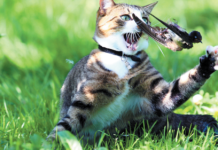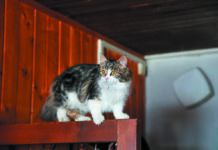Saving Animals, But Perhaps Not with Your Cat’s Diet
Cats are obligate carnivores, meaning they require meat to survive. Granted, some vegan diets have been formulated for pet cats. But such foods, made with lab-synthesized ingredients, tend to be very expensive. And it’s not always clear how well they are absorbed by a cat’s body. That is, just because a nutrient is delivered in a plant food doesn’t mean it reaches all the tissues in the feline body in appropriate amounts. A lot may be eliminated when a cat voids.
Why Cats Don’t Grey as Much as Dogs— or People
You’ll often see dogs greying around the muzzle and eyes as they age, but even though cats tend to live significantly longer than dogs, that same phenomenon doesn’t tend to occur. It’s not that cat hair can’t turn grey. It can. But it doesn’t occur as frequently, or at the same rate.
Has Your Cat’s Vet Spoken to You About the Chill Protocol?
“It used to be thought that animals don’t feel pain,” says Alicia Karas, DVM, a veterinary pain specialist who is board-certified in anesthesiology. It wasn’t that long ago. “The real start of recognizing that animals feel pain and might need medication for it was probably the early 90s,” she notes. “Until then, a vet might say, ‘If I give the animal pain meds after an operation they might move around too much and hurt their surgical sites, interfering with their healing.’ It was a myth that needed to be battled.
The Top 10 Cat Poisons
The Pet Poison Helpline (855-764-7661) has released its list of the top 10 cat poisons for 2024. The list is based on caller data rather than on a formula devised from theory. In other words, these are the toxins actually making people’s cats sick, in the following order:
When Your Cat’s Pupils Become Two Different Sizes
You notice that the pupils—the black circles in the center of your cat’s eyes—are no longer the same size. One has become significantly larger than the other, blocking out much of the iris (the colored part). Or one has become significantly smaller. Either way, it’s not normal. Both pupils are supposed to enlarge to the same degree to allow more light in when the ambient light has dimmed, and they’re supposed to shrink to the same degree to let in less light when the surrounding light has brightened. The condition of one pupil remaining a different size from the other no matter what is called anisocoria, from the Greek aniso, meaning “unequal,” kore, meaning pupil, and the Latin suffix ia, signifying “abnormal.”
The Number 2 Issue: When Your Cat Eliminates Solid Waste Outside the Litter Box
If your cat is defecating outside the litter box, the first thing to do is make sure there’s not something wrong medically. Medical reasons can include the following:
The mat was removed, but now she won’t stop licking the area
Q: My cat had a large mat—about as big as a quarter—that I had removed professionally. But now she will not stop licking herself in that spot. She has become so obsessive about it that the area has become red and warm to the touch. Could an infection have developed there? What should I do?
Cat breeds versus dog breeds
Q: Why is it that dog breeds look so different from each other but all cats look more or less alike? None are super tall or super short, etc.
Should You Switch from Standard Cat Food to Fresh?
Perhaps you’ve seen ads for brands of fresh cat food delivered straight to your door, making you wonder if you should switch from kibble or the canned food you’ve been feeding your cat. Such brands are typically made from human-grade ingredients, shipped to your home on a regular basis via subscription, and stored in the refrigerator between meals.
Download The Full March 2025 Issue PDF
- Scruffing a Cat to Get Him to Cooperate: A Bad Idea
- Morsels
- Bird Flu Becomes a Feline Threat, Even for Indoor Cats
- Between Dying and Death, There’s Hospice
- Keep It Down at the Vet’s Office
- How Long Can a Cat Be Left Alone in the House?
- Feline Grace: It’s an Anatomy Thing
- Dear Doctor
How Long to Keep the Food Once It Has Been Opened
You know to cover and store an open can of cat food in the refrigerator, but how long can you safely keep it there before it should be thrown out? Three to seven days. After that, you can’t be sure there hasn’t been so much nutrient degradation that the cat isn’t getting all the vitamins and minerals the food originally contained. Also, opened canned food that sticks around too long can provide the perfect environment for the growth of harmful bacteria.
Why Some Cats Cover Their Solid Waste and Others Don’t
Burying excrement is a pretty natural cat behavior, but still, there are reasons a cat may leave her waste out in the open. For instance, it’s possible that a cat who leaves her poop uncovered is more territorial. In the wild, cats trying to hide their presence from other animals will cover their feces, but more territorial felines will leave it uncovered to indicate that they have claimed the area.















